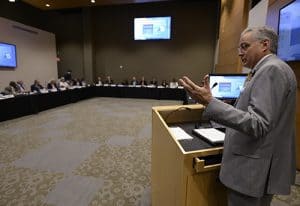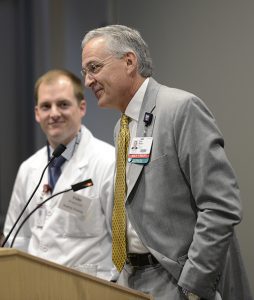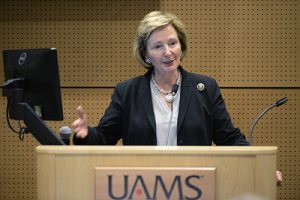Medical Students Host Arkansas Senate and House Public Health Committees
| Oct. 7, 2015 | Arkansas state lawmakers attending Legislator Day at the University of Arkansas for Medical Sciences (UAMS) on Sept. 24 got to hear from medical students who spoke passionately about why they want to be doctors as well as from faculty addressing challenges facing graduate medical education in Arkansas and nationwide.

UAMS Chancellor Dan Rahn, M.D., welcomes state legislators to a medical student-led forum on medical education.
The legislators were members of the Senate and House Public Health, Welfare and Labor Committees. They were invited to be a part of UAMS Legislator Day, a project of the Rural Medicine Student Leadership Association (RMSLA) and the Student Leadership of the College of Medicine Class of 2016.
Chancellor Dan Rahn, M.D., welcomed lawmakers to UAMS and said he looked forward to working with them as they address issues in medical education and access to health care in the state.
Medical students Ben Schurhamer, Evan Branscum and Parth Shah organized the day and offered a personal look at being a medical student.
“My passion is to care for others,” Shah told legislators. “Medicine is a calling.”

Chancellor Dan Rahn, M.D., and medical student Evan Branscum address lawmakers during Legislator Day at UAMS.
He was inspired to choose medicine after his sister was hit by a motorcycle as a little girl while they were far from home and he saw a compassionate physician come to her aid.
“The incident was particularly meaningful because it opened my eyes to a career in which compassion is offered to complete strangers, and the personal satisfaction that must accompany it. I desired to find this meaningfulness in my work,” Shah said.
Branscum spoke about why he has chosen to practice medicine in rural Arkansas and about some of the barriers medical students face when deciding where to practice. He said he wants to help people in rural areas lead healthier lives and have a better quality of life as they age.
Schurhamer told lawmakers that “medicine is a team sport.” In addition to doctors, nurses, and other health care professionals, the state Legislature is part of the team, he said. He wanted to share with legislators about issues important to medical education “so we could work together to streamline the process in the future.”
James Clardy, M.D., professor of psychiatry and associate dean for graduate medical education spoke to the group saying, “You should be proud of your residents. They are prepared when they leave here.”

State Sen. Cecile Bledsoe chairs the joint meeting at UAMS of the Senate and House Public Health committees.
He said more funding is needed to be able to train more medical residents, noting that the funding from the Center for Medicare & Medicaid Services (CMS) that pays for resident training hasn’t changed since 1997. “We’re capped and we need more funding,” he said.
An interactive telemedicine overview and demonstration was provided by Curtis Lowery, M.D., professor and chair of the Department of Obstetrics and Gynecology in the College of Medicine and director of ANGELS, UAMS’ high-risk pregnancy program.
After the presentations, the legislative committees toured the simulation center and gross anatomy lab.
